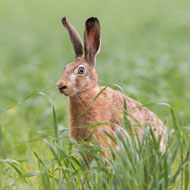Brown hares ‘could benefit from non-native crops’

“Our research suggests that for hares, diversifying farmland by planting biomass crops in small chunks might replace something of what has been lost.” (stock photo)
New research suggests declining brown hares could benefit from non-native crops being grown for bioenergy on British farmland. However, scientists say the way in which crops are planted is just as important as which crops are grown.
Changes in agricultural practices over the past 100 years have contributed to major declines in various species of farmland wildlife. Scientists wanted to explore the effects of new crops being planted across the UK and Europe, in order to be harvested and burned for fuel.
One of the most common biomass energy crops is a giant Asian grass called elephant grass. A research team from the University of Cambridge, University of Hull and the Open University tracked hares in farmland planted with different sized fields of elephant grass.
Where the crop is planted in small blocks, it provides an excellent habitat for brown hares, according to the findings, which were published in the European Journal of Wildlife Research. However, it was found to discourage hares when it was densely planted over a wide area, as their ranges became much bigger than normal, meaning they used more energy travelling longer distances to foraging areas.
Analysis of hare droppings revealed they do not use elephant grass as a food source, but they use it extensively for rest and shelter.
Radio tracking showed hares associated with small-scale planting had home ranges five times smaller than those living in or around large-scale planting. Scientists recorded some of the smallest annual home ranges of hares, at an average of just 10 hectares. This suggests elephant grass can provide for many of the hare’s habitat requirements in a small area, if it is planted at the right scale, and as part of a mixed agricultural landscape.
Dr Silviu Petrovan from the University of Cambridge, who carried out the study, explained: “If ranges are small it indicates that the numbers of hares an area can support is high. We think that hares use elephant grass for cover and then forage around its edges. They also take advantage of the fact that it isn’t sprayed with herbicides, so in places it has quite a rich ground cover of other plants which they feed on, not unlike a small area of young woodland.”
According to Dr Phil Wheeler from the Open University, these benefits may also apply to other wildlife but evidence is currently limited.
“In some respects, although these biomass crops are aliens to the UK, they mimic unfarmed or unintensively cultivated bits of farmland, many of which have been lost as farming has intensified,” he said. “Our research suggests that for hares, diversifying farmland by planting biomass crops in small chunks might replace something of what has been lost.”
The question now is whether it is economically or logistically viable for farmers to plant biomass crops on small scales. If they are only viable when planted over large areas, they could end up being another challenge to farmland wildlife, Dr Wheeler added.



 The BSAVA has opened submissions for the BSAVA Clinical Research Abstracts 2026.
The BSAVA has opened submissions for the BSAVA Clinical Research Abstracts 2026.